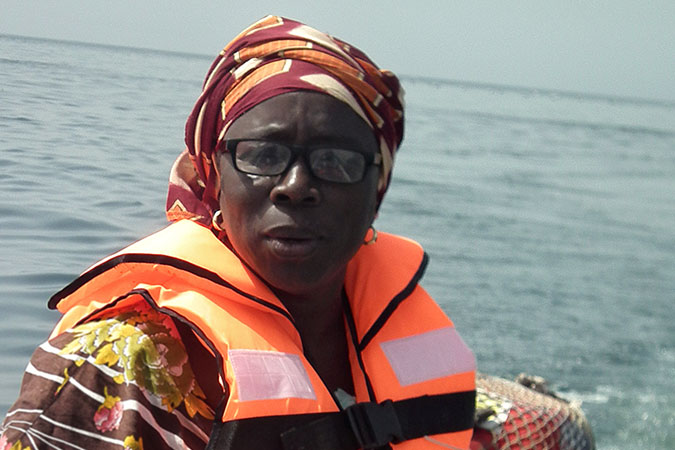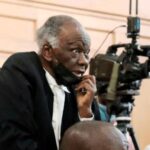It was the year 2006 in Dakar, Senegal. Yayi Bayum Diouf, a single mother of 3 children lived in Thiaroue-sur-Mer, a small fishing village near the capital, Dakar. Unknown to her, the events of that year would transport her from the confines of her humble home into the throes of the sea.
In that fishing community, where Yayi grew up, education wasn’t a priority; boys spent their days learning fishing trade while the girls were also expected to learn how to process the catch.
“When I was a little girl, like everyone else, we would go to the sea, we would fish small fishes and we would sell food over there and everything was around the sea because we didn’t have nurseries, we didn’t have playgrounds, we had nothing else, really. It was like an umbilical cord attaching us. We all had affectionate relation to the sea.”
But Madam Yayi wanted better for her children. So rather than allow them to follow the traditions of Thiaroue-sur-Mer, she sent them to school. When her husband divorced her, life became tough but she made it a point to put her children through private school. A few years after, her son came back home and announced his decision to become a fisherman like his grandfather. As the oldest and only man in the house, Ali felt compelled to provide for his family contrary to his mother’s dream for him to study and have a well-paying job in the future. Given the highly patriarchal society in Dakar, Ali’s wishes held sway over his mother’s concern.
“You know, it’s a very patriarchal society so decisions are made by men. So even if you’re his mother, there is respect but he’s not going to listen necessarily. I tried everything; I wanted to pay for tuition, give him more classes, but he said no and that was it.”
At that time, due to the decline of fishes at sea, most of the fishermen traveled from Dakar to Mauritania during the fishing season and returned with a lot of money because there were better at fishing than the Mauritanians. Ali, who had just turned 26, asked for his mother’s blessings “so that his trip to Mauritania would be safe” and set out for what would be his last fishing trip
“I did that and he went there and about 3 months later he called me and he said, ‘Mom, I just don’t have enough money. There’s not enough fishes; just enough for us to eat – on the day – but not enough to come back with money in our pockets’,” he told his mom.
Yayi hoped that would signal him to come back home, it didn’t. Ali had other plans. He told his mother that he wanted to continue his voyage to Europe like most young men were doing at the time. They would go to Spain, work and send money back home. She didn’t quite agree. “I begged him to change his mind, but he wouldn’t.” And again, he went on his way.
“I’m going to leave to work for you,” he told his mom. “I’m going to go for you, for my family.” Those were the last words Yayi heard from her son.
Ali left with other people from her community – 88 men in total – all crammed on the same boat on a 10-day journey that was supposed to have change their fortunes. He would call his mother when he was all settled in, but it took another 3-4 months before Yayi received news about her son.
“It was my cousin who lives in Tenerife in Spain who told me that there was a boat in the port that looked like it was coming from our village. It was another boat which traveled with them and one of the young men told them that the other boat that was traveling with them didn’t make it. It was March, it was winter and the boat just capsized in the sea during a storm and they didn’t make it.
The other boat had been saved by the Spanish Red Cross, but not the one Yayi’s son was on. All 88 of them died that day at sea. The news broke her heart. She had lost her only son and couldn’t even have his body to mourn and have closure.
“I didn’t get my son’s body and that was very very hard for me because I am a Moslem woman and we go to the tomb of our dead to mourn, so not having that was very very difficult and even now I’ve got all those questions internally and I’m wondering if he’s dead because I can’t go to his body and mourn. I can’t go to his tomb and mourn and it’s giving me a lot of anxiety because I don’t have that closure.”
Pursuing her son’s dream
Had it been any other person, Yayi would have courted fear, perhaps even hatred for the waters that took away her son. But not her. She left her office job and took up fishing. Maybe it was a way to be close to her son. Perhaps she wanted a way to ensure that no mother would have to suffer the same way she did. Whatever the reason may be, Yayi’s courage to break the barriers of her patriarchal society has transformed fishing in her community and has provided a means of livelihood for both men and women in Thiaroue-sur-Mer.
First, she had to get her fishing license.
“Fishing is a very masculine activity. I thought I’d try little by little to convince the local traditional government that I was capable of doing as any other man because we have the same rights professionally. Also, I want to respect my son’s wishes for our family to be like him, replace him. I wanted to take his place in society because he was a fisherman.”
She got mixed responses for her request, with some giving her an outright ‘No’. When she asked why they told her that “the fishes will not come around when a woman has her period because she was unclean”. Her response? “Well, I’m already menopausal so what’s the problem?”
It took a “good approach and good communication with the community” to get through to them but eventually, she got her fishing license.
“It was a big achievement because it was the first time that the community would actually look at how to make women more equal to men.”
Her first fishing trip
Yayi was both scared and excited on her first trip as a fisherwoman. She wasn’t sure what to expect and was concerned about “doing things properly” but also she found the experience very “satisfying”. Others thought differently.
“Because it was the first time, the women were really astonished that I would go out to sea. And some men were saying, look at her, now she’s a man. Some others were saying don’t encourage her. She needs to stop and go back home. You really need to show them that it is possible that you can do this and eventually they will change their mind.”
At sea, Yayi says, “it felt like I was close to my son. It felt like I was next to him and having a conversation with him. Being at sea meant that we were united.”
Although Yayi took to fishing quickly, she soon enough encountered problems. The activities of trawlers from Europe had affected the yield of fish. After studying what she describes as “the ancestral way of fishing”, she decided she would do things a bit differently.
“When I started, fish was quite rare and we had very little. What I did was that I put in place farms to give the fish a better environment to come and reproduce and we got a better sense of what we could fish and eventually had better quotas.”
“Little by little, I started changing the way that things were done. Now at the end of the day, everyone will go home with enough money.
With the help of the United Nations, she now makes fish products and runs a mussel farm using sustainable fishing methods.
Leading other women to sea
Soon enough the other women in the community also wanted to follow her example and find their sea legs. Yayi mets with them and took them through the rules of fishing in their community.
“Every Monday and Friday we have a meeting with other women from our community and all of them ask me if they can come with me. And I say yes, but we need to do things by the rules and I can only take women who are menopausal.
“I told them that I respect all the safety rules and I even went to a center to get better training on current fishing methods. So they had to do same.
Ms. Diouf now has a training center that trains women to fish and to treat fish stocks as an important natural resource. With this center, she empowers women to become financially independent through other forms of trade not limited to fishing alone.
“You need to show that you don’t want to replace men in society. You don’t want to take their place. You just want to have equal rights and have the decency of being able to live and earn money for your family.”
Her campaign against illegal emigration
It didn’t end there. Yayi, now 68, also started a campaign called the Collective of Women for
Integrated Development. The initiative is engaged in multi-pronged prevention and awareness effort to keep the young men in her community from turning to illegal emigration as a route to economic prosperity.
“We led campaigns in the community to show the impact and the dangers of migrating through high seas, but as a woman, it was not easy to have a voice. Gradually, we managed to convince people that it was too dangerous to even try.
“But you also need to speak to the women and try to feminize that issue because it is the mother that pays for the travel sometimes and it is the mother that sometimes pushes the son to go away so you really need to also talk to the women.
The campaign was so effective that the agent in the village who organized the trips has joined her in it.
“He realized that it was wrong to do so and he’s now campaigning with us. We put a center where we take all those young men and we try to give them more skills and train them. We try to really push them away from this idea of going to Europe and try to give them a chance here to do something.”
Fifteen years after losing her son and all that she has achieved in that short time, Yayi describes it as, “a sense of pride and great recognition to have that success in that community. I know that he (her son) is very proud of her.”














